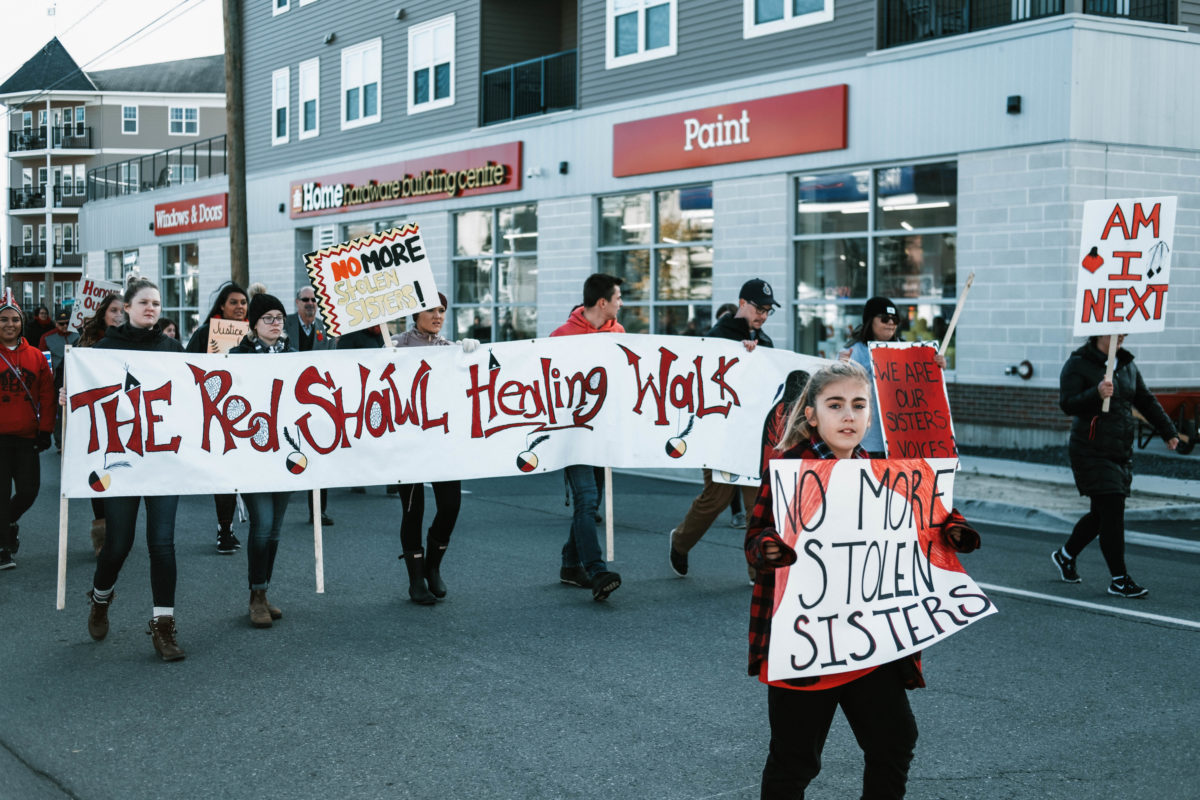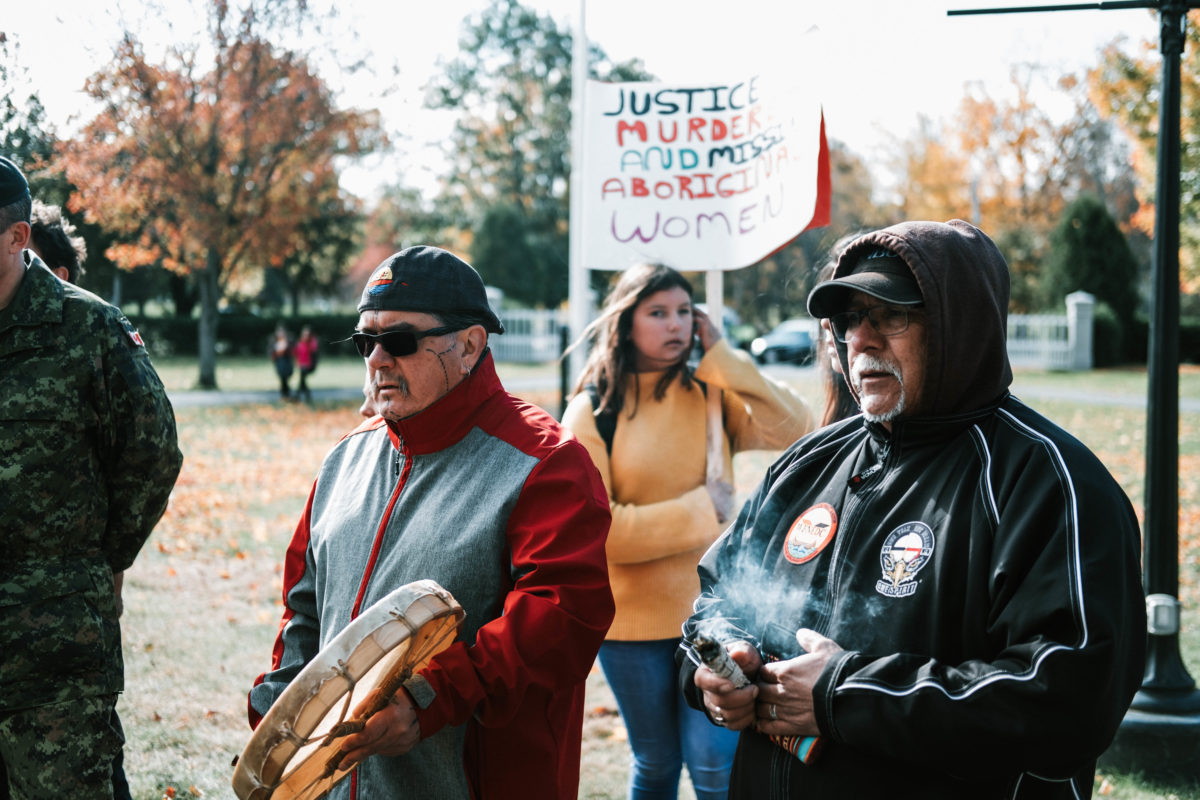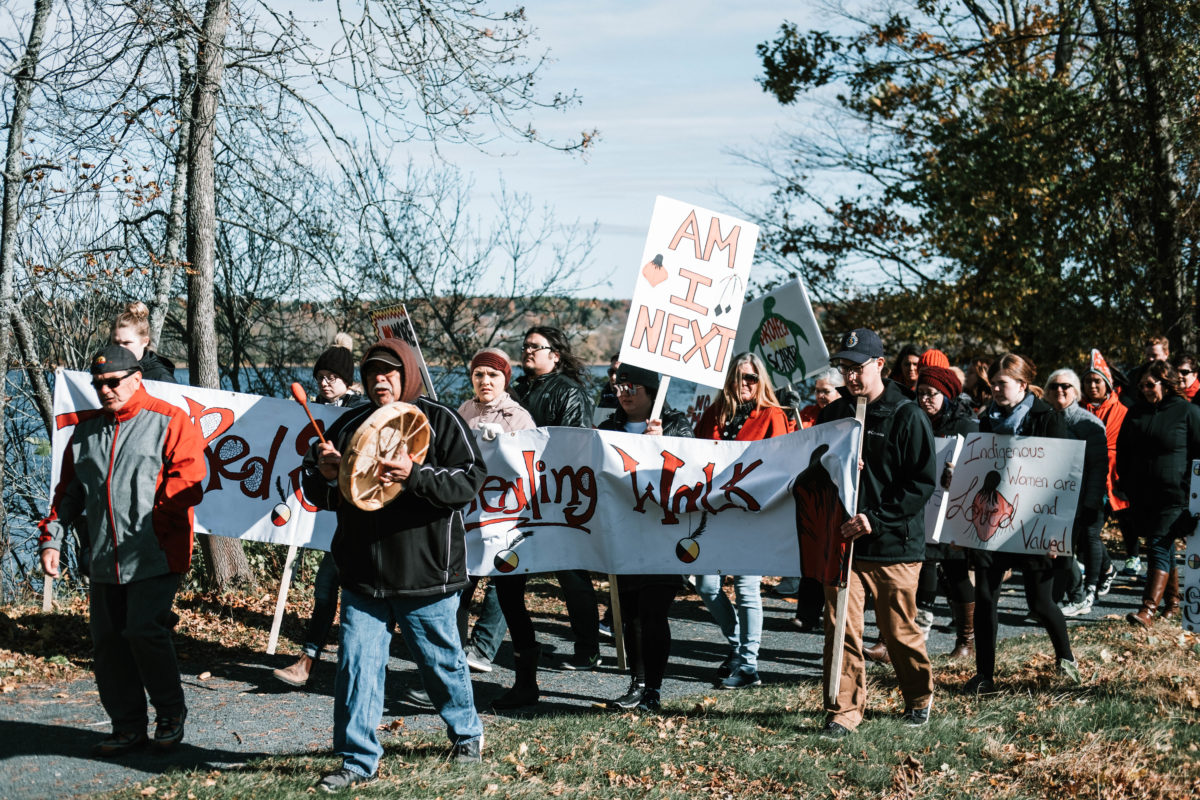

Gathered outside Fredericton City Hall, more than 50 people stood side-by-side to participate in the Walk a Mile in Her Moccasins healing walk on Oct. 19. The march was a part of the Red Shawl Campaign’s week-long event to raise awareness of missing and murdered Indigenous women and girls across the country.
“We’re walking today in the footsteps of our missing and murdered Indigenous women and girls. We’re walking for them because they have families that are looking for them,” said Wolastoqiyik Elder, Opolahsomuwehs (Imelda Perley).
“When we walk, the idea is that we leave moccasin tracks. When we follow those tracks, we follow them to truth and justice.”
The organizers of the event didn’t specifically ask participants to wear moccasins, some did, but many wore shoes. Opolahsomuwehs said it was more of a symbolic act and a chance for non-Indigenous people to show their support.
“I always say there’s a time you have to walk in our moccasins too. We’ve been walking too long in your shoes,” she said.
The event began at City Hall where people spoke on the steps about how the country needs to take action and put an end to these injustices. Fredericton mayor Mike O’Brien, Fredericton South MLA David Coon and Wolastoq Grand Chief Spasaqsit Possesom (Ron Tremblay), all gave opening remarks before the commencement of the healing walk. The walk started at City Hall, stopped at the New Brunswick Lieutenant Governor’s house and concluded at the Delta Hotel.
“This walk is important because it brings awareness of what needs to be done here in our territories and across Canada,” said Spasaqsit Possesom, who drummed and sang songs during the healing walk.
“We need to address this dark past and dark present that is a part of Canada.”

Spasaqsit Possesom is hopeful that proper education will become weaved into school curricula and that awareness programs will be taught in government, so more people are aware of the issue and can prevent more Indigenous women from going missing.
City Hall was lit up red as a show of support by Fredericton for the Red Shawl Campaign and the MMIWG.
“Sometimes the people get so busy they don’t read newspapers or they are not on Facebook. These messages of hope and awareness get missed,” Opolahsomuwehs said. “I want people to know that these things happen right here in New Brunswick and Fredericton.”
Opolahsomuwehs said she doesn’t think the National Inquiry into MMIWG has been effective, but she’s optimistic that it will be in the future.
“I always say it’s given itself a name, but it needs action,” she said. “It can’t be, ‘Let’s talk about it this year and do a report,’ it needs to be all the time.”
She said people should read the literature and watch the videos out there that raise awareness on the issue.
“I understand that when [the New Brunswick Community College] screened the movie Taken, they only had 10 people come see that movie,” Opolahsomuwehs said. “I understand that this stuff is difficult to watch or listen to, but love has to hurt. Sometimes we have to hurt for the ones that are already hurting.”
Spasaqsit Possesom had a bit more to say on its shortcomings.
“Canada has promised the Truth and Reconciliation Commission’s 94 calls to action, they’ve adopted the United Nations’ Declaration on the Rights of Indigenous Peoples without qualification, as well as the National Inquiry into Missing and Murdered Indigenous Women but Canada is not listening and it’s time they do,” Spasaqsit Possesom said. “Those are just words, they’re not following up those words with true commitment.”


Women are valued in Indigenous cultures because they are the life givers and first teachers. They carry the language and values to pass it on.
“We still have the words ‘tuhs’ and ‘kwiss’. Tuhs means my daughter, kwiss means my son. That doesn’t mean I gave birth to young women who are younger than me, but I’m still responsible for their well-being,” Opolahsomuwehs said.
“If a young man goes astray, we don’t say ‘Get out of here,’ we say, ‘Come here kwiss, what’s wrong? How can I help? What’s missing?’ We’re supposed to fill each others’ voids and not go away and just be concerned for our own.”
Spasaqsit Possesom said women are the backbone of his nation.
“Traditionally in Wolastoqook, the grandmothers, or clan mothers, were the leaders the ones who selected our traditional leadership,” Spasaqsit Possesom said. “They were the ones who guided the leaders in which direction we should go.”
He also said the abuse of Indigenous women directly correlates with the destruction of Indigenous lands.
“If you look at the conditions of our communities, and our mother Earth, she is being mutilated, raped, pronged,” he said. “The resources keep … getting taken from her body. The waters are polluted and those are her veins.”
He continued to say that it’s a clear example and comparison of how Indigenous women aren’t being protected.
“They too are being raped, murdered, disrespected,” Spasasqsit Possesom said.
Opolahsomuwehs encouraged people to respect the women in their lives.
“If you’re fortunate enough to still have your mother, tell her you appreciate the first home she offered you. In our language ‘nikuwoss’ is the one who gave us our first home,” she said.
“Thank your aunties, your sisters, all your female friends and relatives. Honour them in a way that they’re never hurt and you never think ill of them, be that protector, because that’s why we look to men — to be a protector, not an abuser.”
